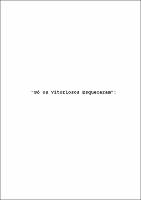Use este identificador para citar ou linkar para este item:
http://rima.ufrrj.br/jspui/handle/20.500.14407/13995| Tipo do documento: | Dissertação |
| Título: | “Só os Vitoriosos Esqueceram”: Intelectuais de direita e as disputas pela memória da ditadura civil-militar brasileira. |
| Título(s) alternativo(s): | “ ‘Only the Victors Forgotten’: Right intellectual and disputes by the memory of Brazilian civil-military dictatorship”. |
| Autor(es): | Moreira, Fernanda Teixeira |
| Orientador(a): | Moraes, Luis Edmundo de Souza |
| Primeiro membro da banca: | Souza, Adriana Barreto de |
| Segundo membro da banca: | Reis, Daniel Aarão |
| Terceiro membro da banca: | Ribeiro, Wanderley Vazelesk |
| Palavras-chave: | memória;ditadura;intelectuais de direita;Memory;dictatorship;right-wing intellectuals |
| Área(s) do CNPq: | Ciências Humanas |
| Idioma: | por |
| Data do documento: | 26-fev-2013 |
| Editor: | Universidade Federal Rural do Rio de Janeiro |
| Sigla da instituição: | UFRRJ |
| Departamento: | Instituto de Ciências Humanas e Sociais |
| Programa: | Programa de Pós-Graduação em História |
| Citação: | MOREIRA, Fernanda Teixeira. “Só os vitoriosos esqueceram”: Intelectuais de direita e as disputas pela memória da ditadura civil-militar brasileira.. 2013. 237 f. Dissertação (Programa de Pós-Graduação em História) - Universidade Federal Rural do Rio de Janeiro, Seropédica. |
| Resumo: | O presente trabalho versa sobre a intervenção de um campo intelectual de direita, a partir da segunda metade da década de 1980, no processo de disputa pela memória do golpe de 1964 e da ditadura civil-militar. Trata-se de um estudo de casos, no qual analiso os discursos e formas de ação no Espaço público do Coronel Reformado Carlos Alberto Brilhante Ustra, do Coronel Reformado Jarbas Passarinho e de Olavo de Carvalho. A escolha partiu do interesse em examinar as imagens do período ditatorial produzidas por esses indivíduos e as formas específicas de intervenção no espaço público em que estão envolvidos. Para tal, parte-se de um questionamento central, qual seja, saber o que legitima a entrada desses intelectuais nas “batalhas pela memória” da ditadura. Assim, constitui como objetivo desta dissertação examinar a intervenção desses que intitulo como intelectuais de direita no processo de disputa e na tentativa de construção e de reconhecimento social de uma versão desse passado recente em que sejam relativizados aspectos negativos associados aos governos civil-militares, a saber, os crimes cometidos por agentes do Estado. Diante do exposto, o eixo articulador da investigação proposta será a análise das estratégias argumentativas e de enquadramento das lembranças e esquecimentos organizados por estes indivíduos que vão a público defender as ideias de um campo intelectual, tal como porta-vozes. Por fim, vale ressaltar que as escolhas de Passarinho, Ustra e Olavo de Carvalho ocorreram no sentido de abarcar as narrativas construídas não só no âmbito dos militares que participaram e foram figuras ativas durante a ditadura, mas também daqueles sujeitos que incorporaram e ressignificaram tais discursos nos anos que sucederam a abertura política e o fim do estado de exceção. Para além, como uma forma de compreender a complexidade dessas narrativas e os diferentes lugares de fala em defesa da ditadura. |
| Abstract: | This present work talks about the intervention of an intellectual field right from the second half of the 1980s, in the dispute process by the memory of the 1964 coup and civil-military dictatorship. This is a case study, in which I analyze the discourses and forms of action in the public space of the Colonel Carlos Alberto Brilhante Ustra, Colonel Jarbas Passarinho and Olavo de Carvalho. The choice came from the interest in examining the images of the dictatorial period produced by these individuals and specific forms of intervention in the public space in which they are involved. To this end, I get a central question, which is, know what legitimizes the entry of these intellectuals in "battles for memory" of the dictatorship. Thus, the objective of this dissertation is examine the intervention of those who I call as right-wing intellectuals in the process of dispute and attempt to build and social recognition of a version of the recent past as they are relativized negative aspects associated with civil-military governments, namely, the crimes committed by state agents. The central theme of the proposed research is the analysis of argumentative strategies and framework of the memories and forgetfulness organized by these individuals who go to public defend the ideas of an intellectual field, as spokespersons. Finally, the choice by the names of Passarinho, Ustra and Olavo de Carvalho occurred in order to cover the narratives constructed not only the military who participated and were active figures during the dictatorship, but also those individuals who continued and incorporated new elements in such speeches after the political opening and the end of the state of exception. That is, a way of understanding the complexity of these narratives and different places of speech in defense of the dictatorship. |
| URI: | https://rima.ufrrj.br/jspui/handle/20.500.14407/13995 |
| Aparece nas coleções: | Mestrado em História |
Se for cadastrado no RIMA, poderá receber informações por email.
Se ainda não tem uma conta, cadastre-se aqui!
Arquivos associados a este item:
| Arquivo | Descrição | Tamanho | Formato | |
|---|---|---|---|---|
| 2013 - Fernanda Teixeira Moreira.pdf | 2013 - Fernanda Teixeira Moreira | 3,19 MB | Adobe PDF |  Abrir |
Os itens no repositório estão protegidos por copyright, com todos os direitos reservados, salvo quando é indicado o contrário.

